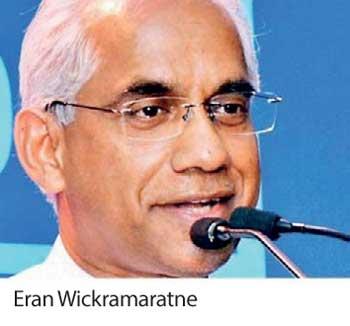Reply To:
Name - Reply Comment
 Sri Lanka must address the fundamental issues in the country’s public sector before moving into a national policy dialogue, Finance State Minister Eran Wickramaratne said.
Sri Lanka must address the fundamental issues in the country’s public sector before moving into a national policy dialogue, Finance State Minister Eran Wickramaratne said.
“I’m convinced no country will rise above without the support of the public sector. The fundamental issues need to be resolved before moving into the national policy,” he said.
He made these remarks addressing the inaugural session of CIMA Business Leaders’ Summit 2019, under the theme ‘Art of Leading the Shift’, in Colombo, yesterday.
The minister stressed that the public sector employees must be rewarded and punished based on the performance-based KPIs, similar to the private sector.
“The promotions and bonuses need to be embedded into KPIs,” he added.
However, Wickramaratne acknowledged that under the current system, the public servants have been rewarded or punished as per the discretion of politicians.
He also advocated that the public sector recruitments must be conducted on merit basis.
In order to attract the required talents to the public sector, he suggested that the public sector salary structure must be shifted to a market-based salary structure.
However, the minister noted that there are serious roadblocks to drive these reforms, from politicians as well as trade unions at times.
Hence, he asserted that the public should demand the political establishment to drive these reforms.
“No single person alone carries these changes. Society needs to acknowledge these are the required fundamental changes,” he said.
Further, Wickramaratne opined that if the public sector employees are exposed to the same knowledge as the private sector professionals, there would be a marked increase in public sector performance.
He illustrated that the public sector employees don’t take into account the concepts such as opportunity cost in their decision-making, which cause delays incurring significant costs to the country.
Speaking on the political aspect in the public sector, the minister affirmed that the politicians with business interests should not be appointed as Cabinet members.
He also emphasised that the deep-rooted culture of political appointments needs to come to an end.
“No single person alone carries these changes. Society needs to acknowledge these are the required fundamental changes,” he said.
Further, Wickramaratne opined that if the public sector employees are exposed to the same knowledge as the private sector professionals, there would be a marked increase in public sector performance.
He illustrated that the public sector employees don’t take into account the concepts such as opportunity cost in their decision-making, which cause delays incurring significant costs to the country.Speaking on the political aspect in the public sector, the minister affirmed that the politicians with business interests should not be appointed as Cabinet members. He also emphasised that the deep-rooted culture of political appointments needs to come to an end.